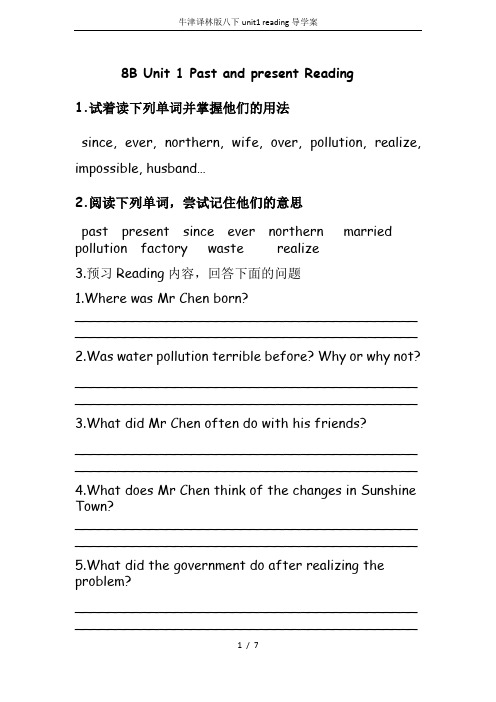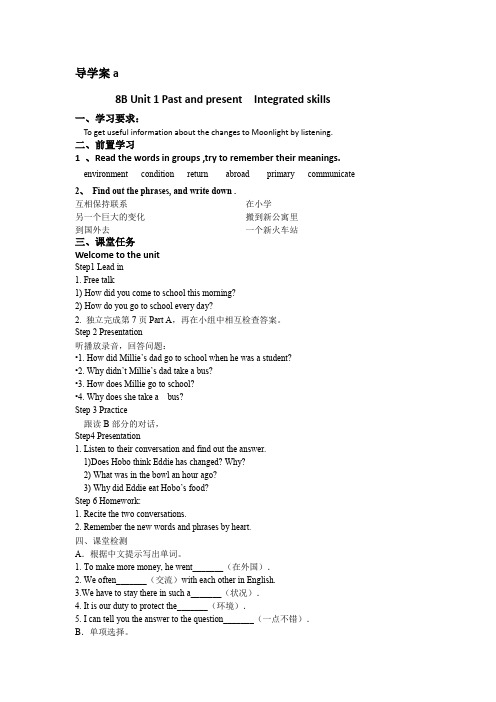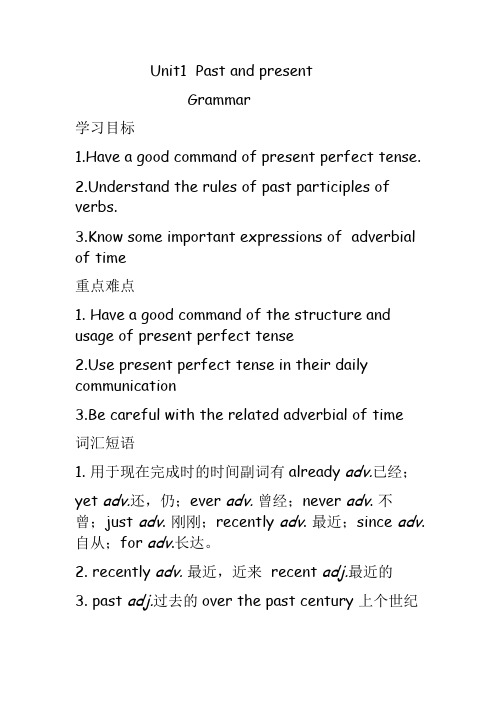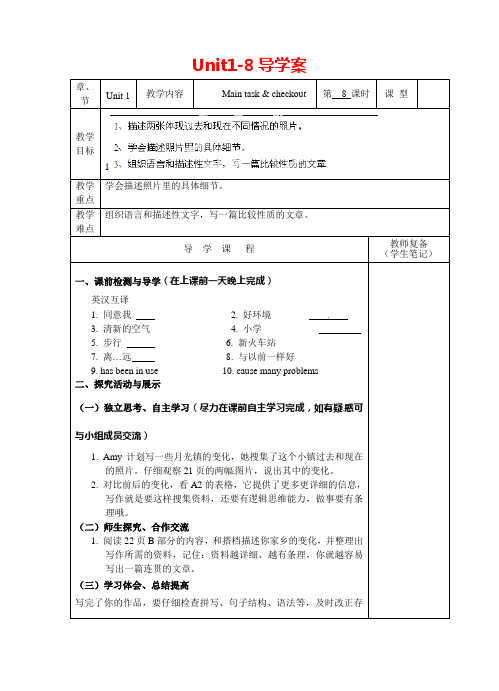2018年春牛津译林版英语八年级下册(导学案)Unit 1 Integrated skills
- 格式:doc
- 大小:33.50 KB
- 文档页数:8

8B Unit 1 Past and present Reading1.试着读下列单词并掌握他们的用法since, ever, northern, wife, over, pollution, realize, impossible, husband…2.阅读下列单词,尝试记住他们的意思past present since ever northern married pollution factory waste realize3.预习Reading内容,回答下面的问题1.Where was Mr Chen born?_________________________________________ _________________________________________ 2.Was water pollution terrible before? Why or why not? _________________________________________ _________________________________________ 3.What did Mr Chen often do with his friends?_________________________________________ _________________________________________ 4.What does Mr Chen think of the changes in Sunshine Town?_________________________________________ _________________________________________ 5.What did the government do after realizing the problem?_________________________________________ _________________________________________一、翻译下列短语1.很了解阳光镇______________________________2.我的绝大多数老朋友__________________________3.搬到两个街区远_____________________________4.采取措施改善这种情况________________________5.在镇的北部________________________________6.下中国象棋________________________________7.水污染____________________________________8.不时地____________________________________9.把废物倒进河里_____________________________10.把……变成一个新公园________________________二、根据句意及提示完成句子1. It is nice to have ______ town.( a beautiful modern)2. It is difficult to see old friends because they have ________ . (moved away)3. Mr Chen feels _______ sometimes. (a bit lonely )4. Tom and Linda have been___________(已婚的)for ten years, but they've never quarrelled.5. Xuzhou is in the_______________(北部的)part of Jiangsu Province.6. Now there are a number of_______________(工厂)in our hometown.7. 政府已经把这个地方变成了一个学校。

导学案a8B Unit 1 Past and present Integrated skills一、学习要求:To get useful information about the changes to Moonlight by listening.二、前置学习1 、Read the words in groups ,try to remember their meanings. environment condition return abroad primary communicate 2、Find out the phrases, and write down .互相保持联系在小学另一个巨大的变化搬到新公寓里到国外去一个新火车站三、课堂任务Welcome to the unitStep1 Lead in1. Free talk1) How did you come to school this morning?2) How do you go to school every day?2. 独立完成第7页Part A,再在小组中相互检查答案。
Step 2 Presentation听播放录音,回答问题:•1. How did Millie’s dad go to school when he was a student?•2. Why didn’t Millie’s dad take a bus?•3. How do es Millie go to school?•4. Why does she take a bus?Step 3 Practice跟读B部分的对话,Step4 Presentation1. Listen to their conversation and find out the answer.1)Does Hobo think Eddie has changed? Why?2) What was in the bowl an hour ago?3) Why did Eddie eat Hobo’s food?Step 6 Homework:1. Recite the two conversations.2. Remember the new words and phrases by heart.四、课堂检测A.根据中文提示写出单词。

八年级下册Unit1 Past and Present Integrated Skills Analysis of students:The subject of my students is the junior school students in Grade 2. Concerning students’psychology,they can be described in these three ways, motivation, confidence, and pressure. For students in Grade 2, they are suffered from the pressure of entering Grade 3,the final grade in junior school. Their motivation and confidence will be changed through this special period. Motivation includes instrumental motivation and integrative motivation. Compared to integrative motivation, most of students’ motivation tends to the instrumental one. For them, they learn English with the purpose of entering a good high school. Therefore, Almost of them are compelled to learn English. They get English knowledge in a passive way. They can get ideal marks in a short time, but their language ability is little likely to improve. In terms of confidence, their confidence will be reduced because of their pressure.As for cognitive ability, for students in junior school, they should have remembered no less than 1600 words and 300 phrases. In fact, most of them still can’t grasp the words completely. Since most of them are weak at English, this part is a little hard for them. Besides, students can understand the single words or phrases but they find it difficult to understand the whole passage through the recording. For language use, students can only make up simple sentences. Their oral abilities still needto be improved.Analysis of teaching material:The English book contains two modules. The first one is Travel in time and space. Another is Rights and responsibilities.Unit1, Past and Present, as the part of Module 1, shows students the different changes happen in their life. Students are able to notice the changes of transport, environment and living conditions. Through such a topic,students can pay attention to the world they live in and express their special feelings due to the changes of their hometown.Besides, each unit is divided into seven parts. They are welcome to the unit, reading, grammar, integrated skills, study skills, task and self-assessment. It focuses on developing students’ abilities in an all-round way.This section is integrated skills, which emphasis in developing students’ listening comprehension knowledge and skills as well as their speaking abilities through teaching activities.The content of this section is about the changes in Starlight Town and the way of communication. This part can be divided into two parts, listening and speak up.As for the listening part,students can develop their listening abilities through filling in the blanks. In terms of speak up it mainly use dialogues to practice students’ daily communication abilities. This text is closely linked with students’ daily life. Students areencouraged to talk about the changes of their life through several ways, like environment, transport, living conditions and communication. It is no doubt that everyone has his own past and they want to talk more about their changes between past and present. Therefore, this text can absolutely arouse students’ interests in listening and speaking. Teaching objectives:Knowledge objectives:1. Students can know how to speak and spell the new words related to the text.2. Students can know about the changes of environment, transport, and living conditions.Ability objectives:1.Students will be able to catch the main ideas of the Starlight town according to the tape, so that their listening abilities can be improved.2.Students will be able to talk about the changes in their life such as environment,transport,living conditions and so on in English,so that their speaking abilities can be improved.Emotion objectives:1. Students’ interests of learning English can be arisen by describing their own past and present.2. Students’ cooperative spirits can be trained by fulfilling some targets.Teaching emphasis and difficulty:Teaching emphasis:1. Students can understand the new words.2. Students can talk about changes of environment, transport and living conditions.Teaching difficulty:1.Students can discuss and talk about which the better life is,past or present life.2. Ss will be able to talk about the changes in their life by themselves. Teaching aid:Slide/ bookTeaching method and learning method:Teaching method:1. Task-based language teaching method2. The communicative approach3. The audio-lingual methodLearning method:Cooperative learning methodTeaching procedures:Step 1: Watch a video (3 min)Show Ss a video about Suzhou’s past and present.(Purpose:It is a good idea to stimulate students’interests at the beginning of the lesson.Such an activity can give the basic knowledge to students on changes.)Step2: Pre-listening: Look and saySs are asked to work in groups to discuss what they can see in the two pictures. The two pictures are about Starlight town’s past and present. (Purpose:Group work can help develop students’cooperative and speaking abilities.Besides,students can find more different changes through the town with the help of others.)Step3: While-listening:1. Extensive listening: Ss will listen to the tape and make multiplechoices.(Purpose:Extensive listening is an important listening strategy for students to get the main idea of the text,which can help their detailed and intensive listening.)2. Intensive listening: Ss will listen to the tape again and finish PartA1,A2 on page 15.(Purpose:Listening the text again to help students practise their listening abilities more.)Step4: Post-listening:Ss will be able to use the information they have heard to finish Part A3 on page 16.(Purpose:This part is to train their ability of dealing with the information they have heard.)Step5: Speak upTask1: Teach Ss the new words by making up a story.(Purpose:This activity can help students learn the new words better since an interesting story will stimulate their interests.)Task2: listen and answerSs will listen to the tape and answer the questions.(Purpose:This activity is to develop students’listening and speaking abilities.)Task3: Read and act it outRead the dialogue together and then ask Ss to work in pairs to act the dialogue out.(Purpose:This part can practice students’speaking and performance abilities.)Task4: EvaluationAsk students to evaluate other students.(Purpose:This part is to develop students’comprehensive abilities. Compared to the knowledge,it is more important to express their own ideas about others.)Step6: DiscussionAfter talking about life in the past and life at present, work in groups to discuss which the better life is.(Purpose:This part can practice students’speaking abilities.Also,it is a good time for them to think about their life.)Step7: Conclusion1. We have learnt about the changes in Starlight Town by listening.2. We have been able to talk about the changes in our life, such as environment, transport and so on.(Purpose:Students can know what they have got in class more clearly by making conclusions.)Step8: Homework1. Surf on the Internet to search more information about the changes of clothes since 1978.2. Write a short article on the changes of clothes since 1978. Use Kitty's diary as a model.(Purpose:Homework helps consolidate what the students have learned in class and strengthen students’writing abilities.)Teaching reflection:Past and present, as a topic, is related to students’ reality life. They would like to communicate with each other and take part in class, so it provides a good atmosphere in class.During this class, I mainly use cooperative learning method to let students think about their own past and present life. On one hand, students can play an active part in class by working in groups.On the other hand, group work affects those students’ confidence if their English are not good enough.Not everyone in the group can fulfill the tasks I have given to them. Therefore, how to divide students into different groups is a very important issue. In order to solve this problem, I will try to give different groups different tasks next time.Listening and speaking abilities are essential to students’ English learning. It will be better if I find more materials for them to consolidate.。

Unit1 Past and presentGrammar学习目标1.Have a good command of present perfect tense.2.Understand the rules of past participles of verbs.3.Know some important expressions of adverbial of time重点难点1. Have a good command of the structure and usage of present perfect tensee present perfect tense in their daily communication3.Be careful with the related adverbial of time 词汇短语1. 用于现在完成时的时间副词有already adv.已经;yet adv.还,仍;ever adv.曾经;never adv. 不曾;just adv. 刚刚;recently adv. 最近;since adv. 自从;for adv.长达。
2. recently adv.最近,近来 recent adj.最近的3. past adj.过去的over the past century 上个世纪4. have an interview with sb./interview sb. 访谈某人5. hear about the film 听说过这部电影6. the changes in Beijing 北京的变化7. the history of China 中国的历史8. each other 彼此语法知识1.They have finished their homework already.2.John has never visited China.3.Mr Li has repaired over ten bicycles since Monday.4.We haven’t seen each other for years.5.My parents hasn’t come back yet.6.Our teacher has taught us a lot about the history of China.Present perfect tense现在完成时(1)表示过去发生的事并且持续到现在。


导学案A8B Unit 1 Past and present Reading 1一、学习要求:Learn some new words and try to master the usage of such words: since, ever, northern, wife, over, pollution, realize, impossible, husband…二、前置学习1 、Read the words in groups ,try to remember their meanings.past present since ever northern married pollution factory wasterealize2. Find out the phrases, and write down .住在这个镇的北部搬到两个街区远自从那时下中国象棋把……变成一个新公园采取措施改善这种情况变化很大不时地三、课堂任务Step One Lead inAsk ss to guess which vehicle it is according to the teacher’s description.Step Two PresentationShow ss two pictures of the city. One is about the past , and the other is about the present.T: Here’re two photos of our city. Are they the same ? What is the difference about them? Step Three Pre- readingAsk ss to close their books and listen to Millie’s interview carefully to get some information on the changes in Sunshine Town. Present the questions on the screen before listening:1)Who did Millie interview? (Mr Chen)2)When did he get married? ( In 1965.)3)Was pollution a problem in the past? ( Yes , it was. But it is better now.)Step Four While-reading1.Ask ss to open their books and read line1 to line 6, then answer questions:1)How long has Mr Chen lived in Sunshine Town ?2)Where did Mr Chen and his wife move?2.Ask ss to read line 7 to line16 and try to fill in the tablePast PresentWhat they had/ have? Some small 1 ,shops, 2 acinema, a 3 factorya park, a theatre, 4Pollution Pollution was 5 then. Thefactory put 6 into the river. The government 7 the problem and took action to 8 .Step Five Post- readingFinish B2 on P10, and ask the better students to correct the mistakes. Step Six HomeworkRead and try to remember the words ,phrases , and sentences四、课堂检测1. Try to complete the following sentences:(1) It is nice to have ______ town.( a beautiful modern)(2) It is difficult to see old friends because they have ________ . (moved away)(3) Mr Chen feels _______ sometimes. (a bit lonely )2. Fill in the blanks①政府已经把这个地方变成了一个公园。
牛津译林版八年级下册英语Unit 1精品教案一、教学内容二、教学目标1. 学生能够理解并运用现在进行时描述正在进行的动作。
2. 学生能够通过阅读文章,了解并描述城市的变化。
3. 学生能够掌握本节课所学的词汇,并能在实际情景中运用。
三、教学难点与重点1. 教学难点:现在进行时的构成及其用法;词汇的掌握和运用。
2. 教学重点:现在进行时的用法;阅读文章并提取关键信息;词汇的学习和应用。
四、教具与学具准备1. 教具:PPT、黑板、教学卡片。
2. 学具:课本、练习册、词汇表。
五、教学过程1. 导入:通过展示一组城市过去和现在的对比图片,引发学生对城市变化的思考,为新课的学习做好铺垫。
2. 新课呈现:a. 通过PPT展示现在进行时的结构,解释其用法。
b. 引导学生阅读文章,提取关键信息,了解城市的变化。
c. 学习词汇,结合图片和例句,帮助学生理解和记忆。
3. 例题讲解:针对现在进行时和词汇进行讲解,通过例题巩固所学知识。
4. 随堂练习:设计相关的练习题,让学生在课堂上进行巩固。
5. 小组活动:学生分组讨论,运用所学知识描述城市的变化,并进行展示。
六、板书设计1. 板书左侧:现在进行时的结构及其用法。
2. 板书右侧:文章关键信息和词汇。
七、作业设计1. 作业题目:c. 用所学的词汇填空。
答案:a. (1)Tom is reading a book in the library. (2)Lily is listening to music in the classroom. b. 1. Our city has changed a lot. 2. People feel happy about these changes. c. 略。
八、课后反思及拓展延伸2. 拓展延伸:鼓励学生在课后观察周围环境的变化,用英语记录下来,并在下一节课上进行分享。
同时,引导学生关注其他时态的学习,为下一单元的学习打下基础。
重点和难点解析1. 教学目标中现在进行时的理解和运用。
译林版八年级英语下册Unit 1 Integrated skills 学案学校________ 班级____________ 姓名__________ 家长签字_______【板块要点】一、教学目标1. Master the imp ortant new word s and phrases.2. Obtain the information of the changes in Starlight town from listening.plete the diary entry about Starlight Town by using the information from the listening.4. Talk a bout past and present about their frie nds and themselves.教学重点1. To obtain the key information from listening.2. To talk about past and present about students’ friends a nd themselves.二、词汇、短语1. environment n. 环境environmental adj.自然环境的,有关环境的2. transport n. 交通车辆,运输工具3. condition n. 环境,条件,状况4. return vi. 返回return = come back(返回)/ give bac k(归还)5 last adv. 最近,上一次;最后adj. 最近的; 最后的vi. 持续6 abroad adv. 到(在)国外7 primary adj. 小学教育的;初级的8 communicate vi.& vt. 交流,交际communication n.9. exactly adv. (答语)正是,没错10. go abroad 去国外11. keep in touch with 和…保持联系12. primary school 小学13. living conditions 生活状况三、句型(语法)1. Starlight Town has changed a lot over the years.2. We haven’t seen each other since then.3. We mainly communicate by email.4. The Internet makes communicati on much easier.。
8B Unit 1 Past and presentwelcome to the unit学习目标:1. 了解北京不同时期的交通工具2. 谈论自己,家人和朋友过去和现在使用的不同交通工具3. 初步认识现在完成时重点词汇:past present just重点词组:1. used to do sth. 过去常常做某事2. share sth. with sb. 和某人分享某物3.go to school by bike骑自行车上学4. in the bowl 在碗里5. take a bus 坐公交6. wait for... 等待……重点句型:1.You used to share food with me!2.It took a long time to wait for the next one.3.You have changed a lot.重难点:1. I’ve just eaten it.用法:(1)just 做副词,意为“刚刚,刚才”通常与现在完成时连用。
举例:Mr Wang has just left our class. 王先生刚离开我们班。
I have just heard the news.我刚听到这个消息。
拓展:just now “刚刚,刚才”常与一般过去时连用,多用于句末。
e.g I met a friend in the street just now.我刚刚在街上遇到一个朋友。
just then “就在那时”e.g. Just then, someone knocked on the front door.就在刚刚,有人敲了前门。
2. You’ve changed a lot.你变了很多。
用法:(1)change 句中“changed”是“change”的过去分词。
此处change为不及物动词,意为“变化,改变”。
举例:The city has changed a lot since 2000.拓展:(2)change 做及物动词意为“交换,改变,换乘”。
Unit1-3导学案章、节Unit 1 教学内容Reading (2) 第 3 课时课型教学目标1.了解掌握本课出现的重点单词和词组。
2.理解课文内容(The chang es to Sunshine Town)。
3.能用本节课所学知识,简单描述周围变化。
教学重点教学难点I moved here with my family when I was two ye ars old and have lived here since then.We lived to gether till 1965, when I got m arried.The factory used to dump its was te into the river.导学课程教师复备(学生笔记)一、课前检测与导学(在上课前一天晚上完成)1. 在文中找到学习目标中的重点单词、词组和句子。
2. 小组讨论这些重点单词、词组和句子的用法,不会的写在黑板上。
二、探究活动与展示(一)独立思考、自主学习(尽力在课前自主学习完成,如有疑惑可与小组成员交流)1.集体朗读课文,注意语音和语调。
2. 角色朗读课文,看谁模仿的像记者。
(二)师生探究、合作交流(如果你能提前做一做,课堂展示能更显风采)3. 教师讲解不会的内容,并检查学生掌握的情况4. 完成课本第10页B部分的练习。
以小测试的形式来核对答案。
教师随意读出释义,学生必须说出正确的单词。
5. 完成课本第101页D部分的练习,然后与各自的同伴比较完成的句子。
全班齐读完成后的句子。
(三)学习体会、总结提高对照教学目标,看自己掌握得怎样。
三、当堂训练与反馈(上课前不必完成)短语翻译:1. 过去常常将废料倒进河里____________________2. 水/大气污染___________3. 采取措施减少污染__________________________4. 空地__________________5. 偶尔感到有点孤独__________________________6. 某种程度上____________7. 扔掉你不想要的东西________________________8. 鞋厂__________________四、课外作业:用所给词的适当形式填空:1. W hat’s the matter? ---- I can’t find my wallet. I_________(lose) it.2. You __________(write) a letter to your father just now,________ you?Yes. And I __________(just post) it.3. We _________(move) to another flat in 1997 and we_________(live) there since then.4. Since they ________(get) to know, they _________(be) good friends.5. Mrs. Yang used to _______(b e) a history teacher, but nowshe_______(be) a writer.。
Unit 1 Past and present
Integrated skills
学习目标:
1. 通过听录音,获取有关星光镇变化的具体信息
2. 根据获取的信息做笔记并完成日记
3. 简单谈论自己和朋友的过去和现在
课前预习:
重点词汇:
environment condition return last abroad primary communicate communication exactly 重要词组:
1.clean and fresh air 干净清新的空气
2. living conditions 生活条件
3. railway station 火车站
4. return from... 从……返回
5. since then 自从
6.primary school 小学
7. keep in touch with...与……保持联系
8. much easier 简单得多
9.move into 搬进
10.over the years 数年来
重难点汇总:
1. transport
transport为不可数名词,意为“交通车辆,运输工具”。
e.g. Have you got your own transport?
你有自己的交通工具吗?
2. Today I borrowed a book about Starlight Town’s past and present.
borrow及物动词,意为“借”
e.g. He used his house as security to borrow the money.他用房子做借钱的抵押。
拓展:borrow,lend , keep
borrow 非延续性动词,意为“借,借来”表示向某人或从某处借来某物。
borrow sth. from sb.
e.g. “Why don’t you borrow your sister’s car?”, said Sandra.
“你为什么不借用你姐姐的车呢?”桑德拉说。
3.lend为非延续性动词,意为“借出,借给”,表示将某物借给某人。
lend sb. sth.=lend sth. to sb.
e.g. Can you lend me your night dress ?= Can you lend your night dress to me?你可以把你的晚礼服借给我嘛?
4.keep为延续性动词,表示“借”时,指“借来并保存”。
keep sth. for…
e.g. You can keep the book for two weeks.
这本书你可以借走两个星期。
5. I hope I can visit it again.
hope为及物动词,意为“希望”。
“hope +that”从句,意为“希望……”
e.g. I hope that you will join us tomorrow.
hope to do sth. 意为“希望做某事”
e.g. I hope to announce the winner shortly.
我希望马上宣布胜利者的名字。
6. I hope so./ I hope not. 用于应答
e.g. —Will you be back before dark?
—I hope so.
你天黑之前能回来吗?但愿吧。
4. She’s just returned from the USA.
return为不及物动词,意为“返回”
return to +地点名词return+地点副词
e.g. Blair will return to London tonight.
今晚布莱尔将返回伦敦。
拓展:return 可以作为及物动词,意为“归还”。
I enjoyed the book and said so when I returned it. 我喜欢这本书,并且在还书时也这样说了。
5. She went abroad with his parents.
用法:abroad 副词,意为“在国外,到国外”前面不加介词。
be/ go/ live/ travel abroad 在国外/出国/居住在国外/到国外旅行
Going abroad was quite an adventure for me.
出国对我来说是一次冒险。
6. So how do you keep in touch with each other? keep in touch 保持联系stay in touch 也是保持联系之意。
e.g. Please keep in touch with us while you are in Hong Kong.
你在香港的时候记得和我们保持联系。
7. We mainly communicate by e-mail.
用法:communicate 不及物动词,意为“交流,交际”,“communicate with sb.”“与某人交流”
一、用词的正确形式填空
1. Look! What a clean room! Who_______(clean)
it, Minnie ?
2. —Who will go to the airport to meet aunt Li? —I will. I_______ (meet) her three times. I can find her easily.
3.I’m sorry I_______ (keep) you waiting for such a long time.
4. Look! How terribly she is coughing! She_______ (catch) a bad cold three days ago.
5. This is the first time Bella_______ (see) such an amazing sea since she was born.
二、单项选择
1. ( ) Sally won’t go to the movies because she _________her ticket.
A. lost
B. have lost
C. will lost
D. lose
2. ( )—I always get nervous when I start a(n) ____with others.
—Take it easy. Believe in yourself.
A. expression
B. introduction
C. communication
D. celebration
3.( )—Have you finished your housework_______ , Edward?
—Yes. I’ve done that_______.
A. yet; already
B. already; yet
C.ever; never
D. still; just
4.( )The steel factory has caused a lot of serious air pollution in Lisa’s hometown_______.
A. last year
B. once a month
C. in five years
D. over the past ten years
5.—Bruce has just come back from the park, _____?
—_______. He won’t come back before 7 p.m. A.Isn’t he; Yes, he is B. isn’t he; No, he isn’t
C. Hasn’t he; Yes,he has
D. hasn’t he; No, he hasn’t
三、根据句意及首字母或汉语提示完成单词
1. Most of _____________(they) have moved into new USA.
2. I think it’s i______ for me to do so much work in such a short time.
3. —You mean Mr Chen diagrees with what I said just now?
—______ (正是,没错) .
4. I enjoy _______(chat) with you and my other friends after class.
5.__________(communicate) between the old and the young is not so easy as you think.
答案:
一、1. has cleaned 2. have met 3. have kept
4. caught
5. has seen
二、1.A 2.B 3.A 4.D 5.D
三、1. them 2. impossible 3. Right 4. chatting
5. Communication。